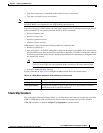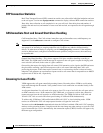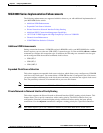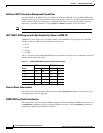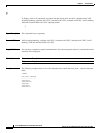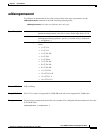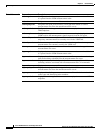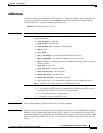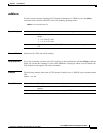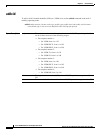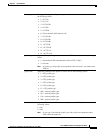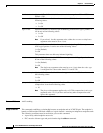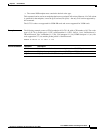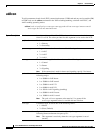
5-5
Cisco VISM Installation and Configuration Guide
Release 3.0, Part Number OL-2521-01 Rev. D0, June 2004
Chapter 5 CLI Commands
addcasvar
addcasvar
To add a channel associated signaling (CAS) variant to a VISM card, name the CAS variant file, and
optionally set the source of the file, use the addcasvar command in the VoIP switching/trunking,
switched AAL2 PVC, and AAL2 trunking operating modes.
addcasvar var-name file-name |source|
Syntax Description
Command Modes VoIP switching/trunking, switched AAL2 PVC, and AAL2 trunking
Usage Guidelines A file containing the variant information must be downloaded to the Cisco MGX 8000 Series platform
PXM card, using a separate application (such as TFTP), before you can execute this command. This
command downloads the specified file from the PXM card and configures the CAS variant on the VISM
card based upon the information in the file. You can use this command at any time to add a new CAS
variant.
var-name Name of the CAS variant; a text string of 1 to 64 alphanumeric characters.
file-name Name of the file that contains the signal definition for the CAS variant. It can be one of
the following values:
• wink_did_dod.o = wink start
• ground_start.o = ground start
• wink_did_dod_mf.o = wink start multifrequency
• q50.o = Q.50
• basic_pbx.o =
• fgd_ea_incoming.o = for endpoints connected to an end office
• fgd_ea_outgoing.o = for endpoints connected to an access carrier
• fgd_os_e911.o = for endpoints connected to FDG OSS (Feature group D operator
services system)
• loop_start.o = loop start
• delay_did_dod.o = dial delay, DTMF
• delay_did_dod_mf.o = dial delay, MF
• immed_did_dod.o = immediate start
• immed_did_dod_mf.o = immediate start, MF
• In the range from 1 to 32 alphanumeric characters—user-configured files only
Note Immediate start is not supported in VISM Release 2.2(0).
source (Optional) CAS variant file location. It can be one of the following values:
• 1 = Unspecified. If TFTP domain is configured, the location is the TFTP server. If
not found in the TFTP server, the file is treated as built-in.
• 2 = User-configured (built-in) file location.
• 3 = External—resides on the TFTP server.



